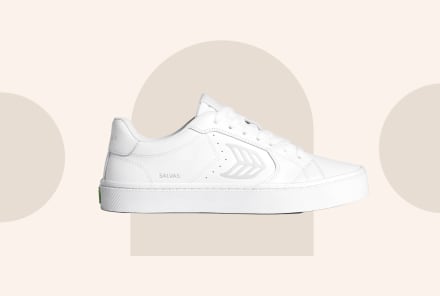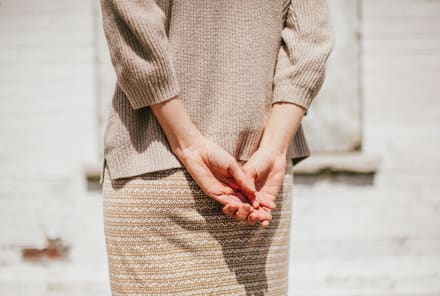Advertisement
Should You Consider Sleeping On The Floor? Benefits & Risks Of Ditching Your Mattress

If you are lucky enough to have a warm, comfortable bed, why would you voluntarily forsake it? Well, whether you've been sleeping in later than usual, or your bedroom has transformed into a makeshift office—chances are you've been spending extra time in bed over the last month. But with all this extra time inside due to stay-at-home guidelines, perhaps you've been been craving some way to mix it up. Or maybe you've been having trouble sleeping, and you're hoping a new spot could help? Whatever the reason for your curiosity, here's what you need to know about any potential benefits (and drawbacks) to sleeping on the floor.
Are there any benefits to sleeping on the floor?
Our cavemen ancestors slept on hard surfaces, and certain cultures today still embrace the practice. Are these folks getting gains that the rest of us mattress-lovers are missing?
Well, there doesn’t seem to be any hard science that supports floor sleeping, but proponents of the habit have theories. In a 2000 article published in The BMJ, physiotherapist Michael Tetley concluded that based on largely anecdotal evidence from non-Western societies (he cites various tribes in Africa and Asia as examples), “natural sleeping and resting postures”—which include various on-the-floor poses—markedly reduce low back pain and joint stiffness1.
Sleeping on a hard floor can also allow the body to move more during the night, as opposed to a softer surface, says Katy Bowman, M.S., biomechanist, and author of Movement Matters and Move Your DNA. And for Bowman, who has been a floor sleeper for several years, she says this nocturnal turning and pressure makes her feel “massaged out” come morning.
“I’m gently pushed head to toe all night long, and as uncomfortable as that might sound (and as uncomfortable as it was earlier on), it’s now part of the daily movement my body needs to feel rested, recovered, and alert,” she explains.
Some concerns with sleeping on the floor.
While Bowman sees the additional movement you get from floor sleeping as a benefit; others see it as a concern.
It’s “disruptive to sleep,” says Michael J. Breus, Ph.D., clinical psychologist, diplomate of the American Board of Sleep Medicine, and a fellow of the American Academy of Sleep Medicine. He also says that sleeping on the floor could, over time, lead to back pain and strain as the unforgiving surface might not allow our spines to curve as they naturally want to. You could also potentially throw out your back as you sleep from turning haphazardly in the night, he adds.
On top of that, floor sleeping could aggravate allergies. “There are more particulates closer to the ground than there are up in the air,” says Breus. And if you live with an animal, “you might breathe in every bit of pet dander and hair.”
You should definitely not try floor sleeping if you have any type of medical condition, like sleep apnea or high blood pressure, says Breus. Older folks should also stick to beds, and if you have low back pain, talk to your doctor first, he adds.
Other ways to promote better sleep.
If you're hoping floor sleeping could be a way to improve any sleep issues, you're probably better off seeking other solutions. Luckily, there are a number of natural sleep aids that can help you rest more soundly.
For example, taking a magnesium supplement may help promote better sleep.* Heather Moday, M.D. recommends trying mbg's sleep support+, especially because it can help you fall asleep, without feeling groggy in the morning.* This particular supplement also features PharmaGABA, which may support increased relaxation and deeper sleep.*
A few other strategies that might help you sleep more peacefully, without ditching your mattress, include turning off your devices at least one hour before bed, avoiding caffeine later in the day, setting up a regular exercise routine, and trying some breathing techniques.
If you still want to try floor sleeping, here's how to do it safely.
If you’re clear on the purported benefits and risks mentioned above and still want to give floor sleeping a go, do so gradually, as it will take your body time to adjust to the difference in pressure:
- Start by getting used to a variety of sleeping surfaces, says Bowman. You can do so by sleeping on the other (potentially firmer) side of your bed. “The mattress won’t be as adapted to your body there, and you’ll be experiencing different pressure,” she explains.
- From there, try another cushioned surface, like the couch or a guest bed.
- Then, when your body is better adapted to different sleeping surfaces, try sleeping on a futon on the floor; then move to a few thin pillows; then work your way down to a rug or sheepskin (which is what Bowman uses).
This process could take a while, Bowman warns—perhaps even years. If, during one of the steps, you find yourself very sore or your sleep quality is diminished, you might want to scale back and try again in a few months.
Though Breus does not recommend floor sleeping, if you are going to do it, he suggests placing something underneath your knees to elevate them as you sleep; this will alleviate pressure on your low back.
Also, don’t use a big, thick pillow, which would “jack your neck up” and make it difficult to breathe, he adds. Instead, use a cervical pillow (e.g. airplane neck pillow) to ensure your neck is supported. Bowman, on the other hand, doesn’t use a pillow at all—something she gradually weaned herself of—as she says it’s helped her reduce chronic headaches.
Oh, and definitely clean your floor before you sleep on it, and clean it often if you continue this habit for the long haul.
Bottom line.
Floor sleeping is something humans have done for many years, and people still practice it today. There are both purported benefits and risks to floor sleeping, so consider both sides before trying it yourself. If you're coping with sleep issues, however, you may want to try alternative sleep-promoting remedies instead.
Watch Next
Enjoy some of our favorite clips from classes
Enjoy some of our favorite clips from classes
What Is Meditation?
Mindfulness/Spirituality | Light Watkins
Box Breathing
Mindfulness/Spirituality | Gwen Dittmar
What Breathwork Can Address
Mindfulness/Spirituality | Gwen Dittmar
The 8 Limbs of Yoga - What is Asana?
Yoga | Caley Alyssa
Two Standing Postures to Open Up Tight Hips
Yoga | Caley Alyssa
How Plants Can Optimize Athletic Performance
Nutrition | Rich Roll
What to Eat Before a Workout
Nutrition | Rich Roll
How Ayurveda Helps Us Navigate Modern Life
Nutrition | Sahara Rose
Messages About Love & Relationships
Love & Relationships | Esther Perel
Love Languages
Love & Relationships | Esther Perel












